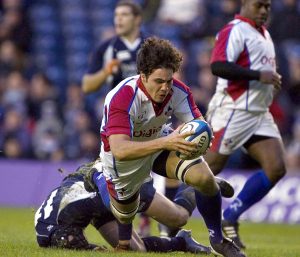The treatment of Pacific Island rugby players in the professional era is compared to colonialism in a new documentary film produced and narrated by former Samoa international Dan Leo.
“Oceans Apart: Greed, Betrayal and Pacific Island Rugby” accuses World Rugby and the sport’s elite nations of exploiting the player resources of the Pacific Islands while retaining almost all of the wealth those players create.
The island nations of Fiji, Samoa, and Tonga have a combined population of only 1.5 million but provide almost a quarter of all professional rugby players. At the 2019 Rugby World Cup in Japan, 42 players of Pacific Island heritage played for nations other than those of their birth or background.
Remittances from Pacific players playing abroad furnish almost 20 percent of the Gross Domestic Product of Fiji, Samoa and Tonga, where the minimum wage, on average, is less than one-tenth of that in developed nations such as Australia or New Zealand.
Leo argues rugby is not only a way of life but a lifeline in the Pacific. Players aspire to become professional and to play overseas because their earnings support families, communities, and sometimes entire villages.
“Oceans Apart” argues the financial pressures on Pacific players and the limitation of choice about where they play makes them ripe for exploitation. Leo says World Rugby has turned a blind eye to that exploitation and of denying the Pacific a voice in the governance of the game which is dominated by the 10 tier-1 nations.
The elite nations — Argentina, Australia, England, France, Ireland, Italy, New Zealand, Scotland, South Africa and Wales — each have three votes on the World Rugby governing council while Fiji and Samoa have one each and Tonga doesn’t have a vote.
Leo heads the Pacific Rugby Players Welfare organization which was formed to represent Pacific players, to lobby for fairer treatment and to address the inequities in the professional game. “Oceans Apart” is his powerful polemic which charges the rugby world of ignoring its own values in allowing the continuing plunder of Pacific talent.
Leo summarizes his view during a visit to the grave of British author Robert Louis Stevenson, who died in Samoa in 1890. Stevenson, the author of “Treasure Island” and “Dr. Jekyll and Mr. Hyde,” settled in Samoa and championed the interests of the Samoan people over those of the colonial powers.
“I can’t help but feel we’re being taking advantage of,” Leo says. “I can’t help but compare colonialism to what’s happening in rugby. Our resources are being continually exploited with very little ever given back.”
He sees the eligibility rule as a central cause of the Pacific nations’ plight. Pacific players are often “captured” early by major nations, recruited even as teenagers and steered into those national teams. Having played for another country, they no longer can represent their Pacific homelands which are progressively weakened by the loss of their best players.
“World Rugby currently operates a one nation for life rule, forcing players to give up a huge part of their identity,” Leo says. “These players could choose to play for their island teams. But knowing you’ve got villages, families and communities relying on the money sent back from overseas rugby players, it can often seem selfish to play for your island team knowing how little money you’ll receive.”
Former Tonga captain Inoke Afeaki describes a “slave-owner mentality” among wealthy clubs and nations which believe they “own” Pacific players.
Leo proposes three remedies: Fairer sharing of the wealth Pacific players create; an end to the eligibility rule which would allow island players to choose to play for their home nations, and an increased voice for the Pacific in World Rugby.
Leo’s view is supported by Tonga-born England international player Mako Vunipola.
“There’s a lot of people like myself who go overseas to try and find a better life and provide for people back home,” Vunipola told Britain’s Press Association. “So you can’t take that away from them, that opportunity of playing for someone else, representing a different country.
“But I also feel for those who need an opportunity just to get themselves on to the international stage and getting themselves a better chance. It’s a catch-22 really.”
Reporting by Steve McMorran for the Associated Press in Wellington, New Zealand.

































